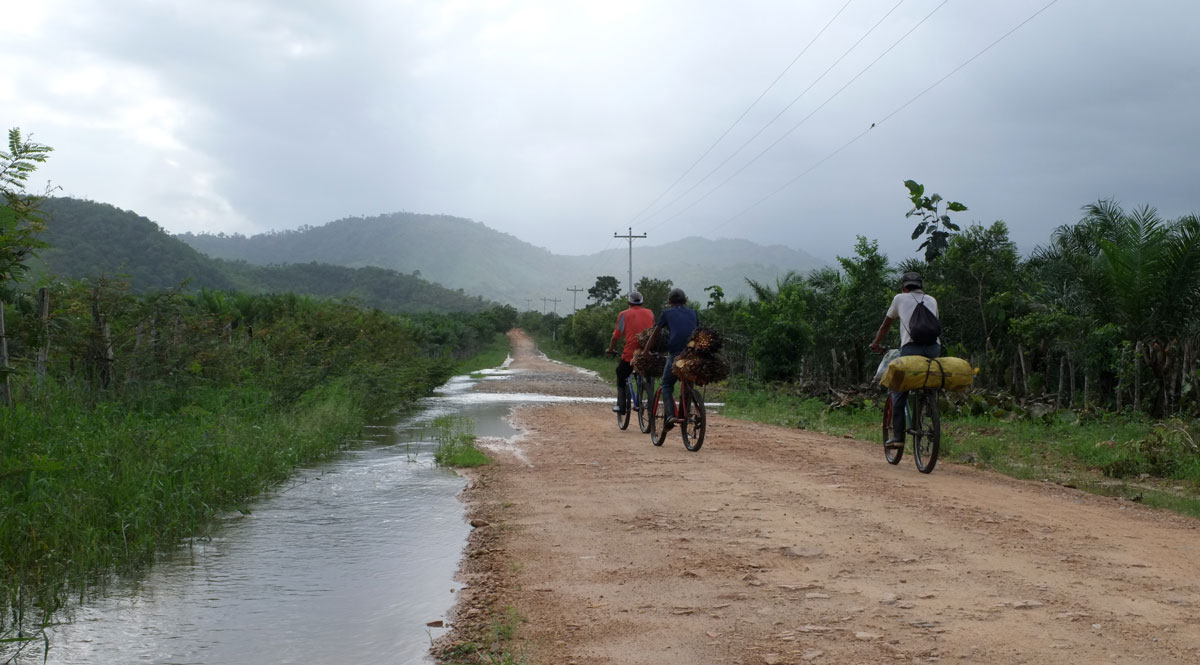A lawsuit filed in a U.S. court alleges that the World Bank Group aided a campaign of terror against peasants who have tried to block a powerful Honduran palm oil company’s expansion of its industrial-scale plantations.
The suit accuses the bank’s business-lending arm, the International Finance Corporation, of “knowingly profiting from the financing of murder” by supporting the Dinant Corporation during a bloody land war in which the agribusiness conglomerate’s security forces allegedly murdered and assaulted local farmers. The case was filed in U.S. District Court in Washington, D.C., by EarthRights International, a nongovernmental organization concerned with human rights and environmental issues.
The suit on behalf of 17 Honduran farmers and their family members claims that Dinant hired “paramilitary death squads and private assassins” to eliminate opponents in the struggle over land rights in the Bajo Aguan region of northern Honduras. It alleges that the IFC “provided critical capital funding and moral cover” to Dinant even though it knew – or had reason to know – that Dinant was targeting peasants with threats and violence.
The IFC referred the International Consortium of Investigative Journalists to a webpage with previous press statements on its relationship with Dinant, which did not address the lawsuit filed Tuesday. The IFC has acknowledged that its handling of investments in Dinant was flawed, but has pointed to steps it has taken to reduce violence in Bajo Aguan, such as persuading Dinant to disarm security guards on its plantations and initiating a mediation process between the company and peasant organizations.
Dinant spokesman Roger Pineda criticized ICIJ’s questions to the company, which asked for Dinant’s reaction to allegations made in the legal complaint.
“I am sorry that so little respect is felt for Dinant’s more than 8,000 employees, their families, its shareholders and the communities that work with us, as to imply such blatant falsehoods,” Pineda said via email.
When pressed by ICIJ for a response to the substance of the charges, Pineda replied: “You have our response. And we expect you quote it, entirely.” (See the full email exchange between ICIJ and Dinant here.)
The case is a civil lawsuit seeking a finding of liability against the IFC and a subsidiary, the IFC Asset Management Company. Although no criminal penalties are at stake, it is the first time that communities affected by World Bank Group projects have accused the bank of criminal conduct, according to EarthRights.
Dinant is not a defendant, but it is accused in the suit of crimes including wrongful death, assault and false imprisonment. Seven of the plaintiffs are family members of peasants who allegedly were killed by security forces linked to Dinant.
Caroline Bettinger-Lopez, a professor at the University of Miami School of Law who specializes in international human rights law, said a central issue that would determine the lawsuit’s success was its challenge to the IFC’s claims of immunity.
A previous case filed by EarthRights involving an IFC investment in India was dismissed by a federal court due to the IFC’s immunity privileges, which are similar to those enjoyed by foreign governments. EarthRights has appealed that decision to a higher court.
“I think the India case is likely to be highly influential in the court’s decision on this case,” Bettinger-Lopez said. She said a key question would be “whether the immunity arguments made in the case differ from the immunity arguments made in the India case.”
One notable distinction between the cases is that the Dinant case names the IFC subsidiary, the IFC-AMC, as a codefendant – an entity which, according to the complaint, does not enjoy the same immunity as the IFC.
The violent land struggles in Honduras’ Bajo Aguan region, including the murder of a local preacher whose body was discovered on Dinant’s plantation, were examined in a 2015 ICIJ report. That story was part of an investigation by ICIJ, The Huffington Post and other media partners that found that development projects financed by the World Bank Group had physically or economically displaced an estimated 3.4 million people over the previous decade.
Earthrights’ lawsuit challenges the prevalent view that the land conflict in Bajo Aguan involved violence on both sides.
The suit recounts cases in which peasants were allegedly shot down in their homes or their fields or while traveling on their bicycles, rather than during violent land takeovers. In one instance, the lawsuit claims that Dinant guards opened fire on a group of women and children who were sheltering on government property that belonged to Honduras’ National Agrarian Institute after being driven from their homes by floods. Two people were injured in the incident, the suit claims.
A statement by the National Agrarian Institute issued after the incident condemned “acts of violence against defenseless persons” by Dinant’s guards.
While the substantial majority of the victims of Bajo Aguan’s land conflict have been peasants, there are reports that the peasant movements have acted violently as well. In one 2011 incident detailed in a report by Human Rights Watch, four Dinant security guards and a Dinant farmworker were allegedly murdered by peasants attempting to forcibly take over a plantation. The farmworker had been tortured and his ears had been sliced off, Dinant told Human Rights Watch.
The violence in Bajo Aguan had subsided in recent years after the conflict, including the IFC’s support for Dinant, drew international attention. But there are signs that it may be increasing again.
In October 2016 two leaders of the peasant rights organization MUCA were shot and killed by a “paramilitary death squad,” according the lawsuit. The suit says the attackers shot one of the MUCA’s leaders, Silmer Dionisio George, in front of the group’s office and then pursued the group’s president, José Ángel Flores, as he tried to escape.
Flores was shot dead as he tried climb over a wire fence, the suit says.
Read more about the impact from ICIJ’s investigations, and find out how you can support ICIJ’s work
Find out first! Receive ICIJ’s investigations by email
